Unit 2 What's the matter
人教新目标八年级英语上册第二单元讲义(Unit 2 What's the matter)
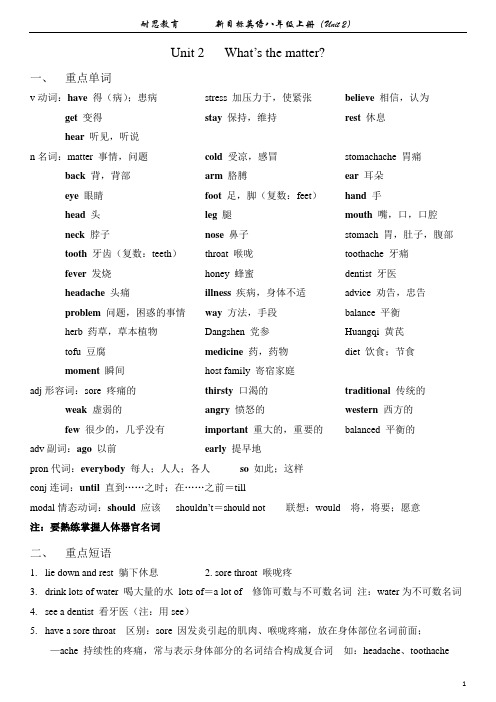
Unit 2 What’s the matter?一、重点单词v动词:have得(病);患病stress 加压力于,使紧张believe相信,认为get变得stay保持,维持rest休息hear听见,听说n名词:matter 事情,问题cold受凉,感冒stomachache 胃痛back背,背部arm胳膊ear耳朵eye眼睛foot足,脚(复数:feet)hand手head头leg腿mouth嘴,口,口腔neck脖子nose鼻子stomach 胃,肚子,腹部tooth牙齿(复数:teeth)throat 喉咙toothache 牙痛fever发烧honey 蜂蜜dentist 牙医headache头痛illness疾病,身体不适advice 劝告,忠告problem问题,困惑的事情way方法,手段balance 平衡herb 药草,草本植物Dangshen 党参Huangqi 黄芪tofu 豆腐medicine药,药物diet 饮食;节食moment瞬间host family 寄宿家庭adj形容词:sore 疼痛的thirsty口渴的traditional传统的weak虚弱的angry愤怒的western西方的few很少的,几乎没有important重大的,重要的balanced 平衡的adv副词:ago以前early提早地pron代词:everybody每人;人人;各人so 如此;这样conj连词:until直到……之时;在……之前=tillmodal情态动词:should 应该shouldn’t=should not 联想:would 将,将要;愿意注:要熟练掌握人体器官名词二、重点短语1.lie down and rest 躺下休息2. sore throat 喉咙疼3.drink lots of water 喝大量的水lots of=a lot of 修饰可数与不可数名词注:water为不可数名词4.see a dentist 看牙医(注:用see)5.have a sore throat 区别:sore 因发炎引起的肌肉、喉咙疼痛,放在身体部位名词前面;—ache 持续性的疼痛,常与表示身体部分的名词结合构成复合词如:headache、toothachehave a cold 感冒have a headache/stomachache/toothache 头痛/胃痛/牙痛have a+名词表示患病的意思6.hot tea with honey 加蜂蜜的热茶7.eat something 吃一些东西否定句中用anything 例:You shouldn’t eat anything.8.feel well 感到舒服9. a good idea 一个好主意10.about a week ago 大约一个星期前11. I think so 我想是这样12.be stressed out 紧张的13. go to bed early 早点上床睡觉14.drink some water 喝一些水15. listen to music 听音乐16.traditional Chinese doctors 传统的中医17. for example 例如18.a balance of yin and yang 阴阳平衡19. eat hot yang foods 吃一些壮阳的食物20.Chinese medicine 中药21. be popular 受欢迎22.be weak/tired 虚弱/疲劳23. in many western countries 在许多的西方国家24.be easy to 很容易做某事25. have a healthy lifestyle 有一个健康的生活方式26.get tired 变得疲劳27. a few nights 几个晚上 a few+名词复数形式28.other healthy food 其他健康食品29. ask sb for advice 向某人征询建议30.give the best advice 给出最好的建议31. be important to…对……很重要32.sleep eight hours a night 一夜睡八个小时33. need to do sth 需要做某事34.get stressed out 变得紧张35. eat a balanced diet 均衡饮食36.stay/keep healthy 保持健康37. give you medicine 给你开药38.at the moment 现在39. have a lot of headaches 头很痛40.study late 学习很晚41. host family 寄宿家庭42.need some conversation practice 需要一些会话练习practice 不可数名词43.really nice 非常好44. too much 太多三、重点句型1.——What’s the matter with Gina?吉娜怎么了?——She’s tired. 她累了①tired 疲倦的它可以与be、feel、get、look搭配使用be tired 身体所处的状态feel tired 强调身体的感觉get tired 侧重身体的变化look tired 侧重视觉效果②What’s the matter? 询问别人的病情同义句:What’s wrong with you? What’s your trouble?③It doesn’t matter 一般用于回答对方的道歉,意思为没关系!2.I have a sore throat 我喉咙疼have 患(病)的意思have a+名词表示患有某种病症3.That’s a good idea. 那是个好主意4.Traditional Chinese doctors believe we need a balance of yin and yang to be healthy.传统中医认为阴阳平衡,这样才能健康。
八年级英语上册 unit 2 what’s the matter重难点解析 人教新目标版
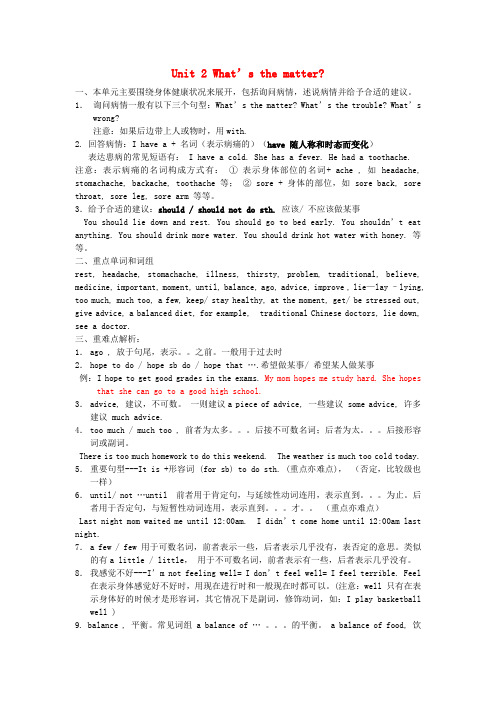
Unit 2 What’s the matter?一、本单元主要围绕身体健康状况来展开,包括询问病情,述说病情并给予合适的建议。
1.询问病情一般有以下三个句型:What’s the matter? What’s the trouble? What’s wrong?注意:如果后边带上人或物时,用with.2. 回答病情:I have a + 名词(表示病痛的)(have 随人称和时态而变化)表达患病的常见短语有: I have a cold. She has a fever. He had a toothache. 注意:表示病痛的名词构成方式有:① 表示身体部位的名词+ ache , 如 headache, stomachache, backache, toothache 等;② sore + 身体的部位,如 sore back, sore throat, sore leg, sore arm 等等。
3.给予合适的建议:should / should not do sth.应该/ 不应该做某事You should lie down and rest. You should go t o bed early. You shouldn’t eat anything. You should drink more water. You should drink hot water with honey. 等等。
二、重点单词和词组rest, headache, stomachache, illness, thirsty, problem, traditional, believe, medicine, important, moment, until, balance, ago, advice, improve , lie—lay –lying, too much, much too, a few, keep/ stay healthy, at the moment, get/ be stressed out, give advice, a balanced diet, for example, traditional Chinese doctors, lie down, see a doctor.三、重难点解析:1.ago , 放于句尾,表示。
Unit Two What’s the matter(教案)
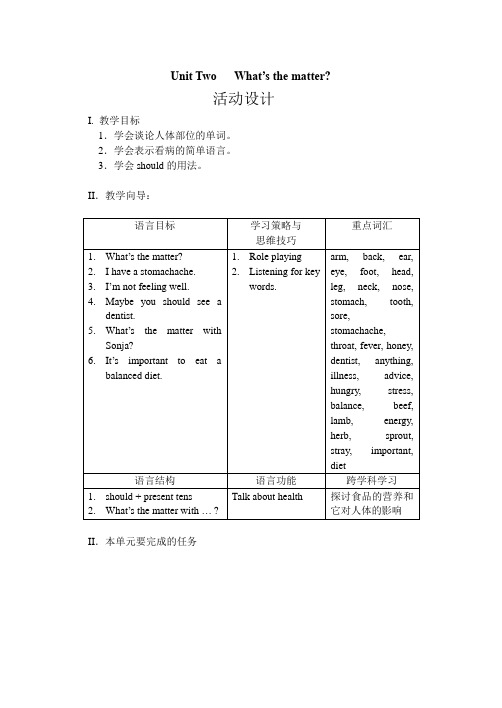
Unit Two What’s the matter?活动设计I. 教学目标1.学会谈论人体部位的单词。
2.学会表示看病的简单语言。
3.学会should的用法。
II.教学向导:II.本单元要完成的任务Task 1 哪些同学经常头疼、发烧、神经紧张,为什么?1.Lead – inDo you know your classmates well? Do you know your close friends well? Do you why some students have a headache, some have a fever and some are stressed out?2. 在表格上写出你所调查的三个同学或朋友,问问他们是否经常头痛、神经紧张,是否经常感冒?为什么?3.最后向全班同学汇报。
Task 2 哪些同学身体比较健康,他们不常生病,为什么?给他们学习带来什么好处?1.Lead – in有些同学身体非常健康,他们很少生病,请你向他们作一调查。
2.在表格上写出你所调查的三个同学。
请教他们身体好的原因,并向他们调查身体好给他们带来了什么益处。
3.想全班作一汇报。
Task 3 查资料作出对有益健康的食品的评价,那些食品补阳,那些食品补阴。
1. 食品使人不可缺少的,但是哪些食品对人健康有益,那些有害于健康,是我们需要分辨的。
2.请同学们对自己较为熟知的食品作一调查,看看那些食品补阳,那些食品补阴,并把结果写在表格里。
3.在课堂上四人一组进行讨论,每组派一名同学把讨论结果向全班汇报。
看看那组作的好。
Task 4 讨论如何保持健康小组活动个人谈谈对保持身体健康的建议,作记录,保持健康要做到那几点。
最后向全班同学建议。
并把它作为回家作业,用写信的方式把它写出来,并做成portfolio向全班同学展示。
八年级英语新目标上Unit 2 Whats the matter单元语法辅导

1. What’s the matter?1)用来询问对方所遇的麻烦事,也是询问病人病情最常用的问句, 意为“怎么了?”常与介词with连用What’s wrong with you? 你怎么了?=What’s the trouble with you? 你怎么了?=What’s your trouble? 你怎么了?2) matter①事情:I have some important matters to ask you.②毛病,麻烦事:What’s the matter with you?③要紧,有关系:It doesn’t matter.2.should表劝告、建议1)情态动词,不能单独作谓语,后接V-原形共同构成谓语。
无人称和数的变化You should lie down and rest.She should drink more water.2) 否定:shouldn’t= should not“不应该”You shouldn’t be late again.They shouldn’t talk loudly in the classroom.3.表示建议的句型let’s doWhy not do= why don’t youWhat/how about doing…Would you like to do …?Shall we do…You’d better do …4.I’m not feeling well=I don’t feel well.=I feel terrible.1) feel“感觉到;觉得”。
系动词,后接adj.I feel cold.补充:系动词+adj.构成系表结构2) well此处为adj.意为“身体好的”,此时well不能用good代替。
回忆:well作adv. “好地”,修饰v.play well, sing well…5.I hope you feel better soon.(1) 这是一个宾语从句。
人教版新目标八年级英语上册Unit2 What's the matter知识点总结

Unit2 What’s the matter?考点:1.Sentences:1.What’s the matter? I have a cold.2.I have a headache/stomachache/toothache/sore back/sore throat.3.You should go to bed/drink some water.4.Traditional Chinese doctors believe we need a balance of yin and yang to be healthy.5.Eating Dangshen and Huangqi herbs is also good for this.6.It’s easy to have a healthy lifestyle, and it’s important to eata balanced diet.2.情感目标: Help the student learn how to talk about health problems and giveadvice on that with the language points.3.教学重、难点: Talk about your health and give advice.知识点:I.应掌握的词组:1.Have a cold 感冒2.sore back 背痛3.neck and neck 并驾齐驱, 齐头并进4.I have a stomachache 我胃痛= I have got a stomachache=There is something wrong with my stomach=My stomach hurts = I have (got) a pain in my stomach5.What’s the matter? 怎么了?= What’s the trouble (with you)? = What’s your trouble?= What’s wrong (with you)? =What’ the matter (with you)?=What has happened to you? =Is there anything wrong (with you)?= what’s up?6.sore throat 咽喉痛7.lie down and rest 躺下休息8.see a dentist 看牙医9.drink lots of water 多喝水10.hot tea with honey 加蜂蜜的热茶11.That’s a good idea 好主意12.That’s too bad 太糟糕了13.I think so 我认为如此14.I’m not feeling well.我觉得不太舒服= I’m not feeling fine/all right.= I’m feeling ill/sick.=I feel terrible/bad.= I don’t feel well.15.get some rest 多休息16.I have no idea = I don’t know我不知道17.stressed out 筋疲力尽18.I am tired 我累了He is tired.他累了19.a healthy lifestyle健康的生活方式20.traditional Chinese doctors传统中医21.a balance of yin and yang阴阳调和22.you have too much yin.你阴气太盛23.to eat a balance diet饮食平衡24.healthy food 健康食品25.stay healthy 保持健康=keep healthy=keep in good health = keep fit26.enjoy oneself (myself, yourself, herself, himself, themselves, ourselves, itself反身代词) 玩得高兴, 过得愉快=have a good time = have a wonderful time=have fun27.enjoy sth.=like sth.(名词)喜欢某物,enjoy doing sth.喜欢做某事=like do i ng sthPractice doing sth.练习做某事,mind doing sth.介意做某事,finish doing sth.完成某事,give up doing sth.放弃做某事,can’t help doing sth.忍不住做某事,keep ding sth.坚持做某事.即: practice, mind, finish, give up, can’t help, keep 与enjoy用法基本相似 28.at the moment = now 此刻29.Host family 东道家庭30.Conversation practice会话练习31.I’m sorry to hear that.听到此事我很难过II.应掌握的知识点和句子:1. —What’s the matter? 怎么了?—I have a cold.我患感冒了。
Unit2What’sthematter?教案教学设计(新课标版英语八年级)

Unit2What’sthematter?教案教学设计(新课标版英语八年级)Unit 2 What’s the matter?Section A一、教师寄语Reading is to the mind what exercise is to the body. 读书养心,锻炼健身。
二、学习目标知识目标:Words: matter; have; cold; stomachache; sore; back; arm; ear; eye; foot; hand; head; leg; mouth; neck; nose; stomach; tooth; throat; toothache; fever; rest; honey; dentist; should; headache; shouldn’tPhrases: have a cold have a sore throat have a fever see a dentistSentences:1. What’s the matter? I have a cold.2. I have a headache/stomachache/toothache/sore back/sore throat.3. You should go to bed/drink some water.能力目标: Enable the students to talk about health problems and give advice with the language points.情感目标: Help the students learn how to talk about health problems and give advice on that with the language points.三、教学重、难点Talk about your health.and give advice.四、学习过程1预习导学或自测Ⅰ.Students look at the pictures on the blackboard and learnthe new words about the parts of the body.1. b______2. n_____3. he_____4. ha_____5. ea_____6. ey_____7. f______ 8. m_____ 9. ne_____10. a______ 11. s_______ 12. l_____2.自主学习1.看医生/牙医2.感冒3.患牙痛4.患头痛5.发烧6.躺下休息7.喝大量水 8.喝热蜂蜜茶9.有压力 10.保持健康3.合作探究 .完成表格后对话。
新目标八年级英语上册Unit 2 What's the matter?预习学习复习指导材料

1 八年级上册英语 Unit2 What ’s the matter?【6—1】 预习学习复习指导 201110▲学习目标 1.学会身体各部位名称的英文表达方式;2.学会表达身体的种种不适;3.能够对他人身体的种种不适给予适当的建议;4.学会合理安排自己的饮食。
▲预习学习复习指导(一)Section A P.7-P.91.matter 的用法⑴ n. 事情;问题;要紧(事);(the ~)麻烦事,毛病例:What ’s the matter (with …)? = What ’s wrong (with …)?= What ’s the trouble (with …)? 或What ’s up (with …)?(…)怎么啦?(…)出什么毛病了?⑵ v.(主要用于否定句和疑问句)有关系;要紧例:It doesn ’t matter. 没有关系。
不要紧。
2.——have a cold (a 不可省略)患感冒;→have a bad cold 患重感冒另外,还可以说:take/catch/get (a) cold (cold 前没有adj.时可省a )3.stomach n. 胃;胃部。
注意其复数形式:stomaches ×→stomachs √4.——have a (high) fever 发(高)烧5.rest ① n. 休息;静止;睡眠——可数或不可数——get some rest 作一些休息;休息一会儿(一阵)——have/take a rest 休息一下; →have a good rest 好好休息一下② v.(使)休息;(使)静止:例:1)You should lie down and rest.2)He stopped to rest himself(the horse).6.so ① pron. 如此,这样(在think, hope, guess 等动词后作宾语)。
比较下列说法:例: 1)I think so.(肯)→I don ’t think so.(否) 不可说:I think not. ×但是2)I hope/guess so.(肯)→I hope/guess not.(否)不可说:I hope/guess so. ×② adv. 如此,那么(修饰adj. adv.):He is so tired.③ conj. 因此,所以(表示结果):He was ill, so he did n’t come to school.7.advice 的用法⑴ advice n. 建议;劝告;忠告 ——是不可数名词,因此要注意下列说法:1)an advice × →a piece of advice √ 一条建议 ----------------------------------------------------------------------------------------------------------------------2)two advices×→two pieces of advice√两条建议3)some advices×→some advice或some pieces of advice√一些建议⑵词组——ask for sb.’s advice =ask advice of sb. 征求某人的建议(劝告)——give sb. advice (on …) 给某人提出(关于……的)建议例:Mr. Smith gave us some advice on how to learn English.——take/follow one’s advice 接受某人的建议(劝告)——do sth. by/on one’s advice 根据某人的建议(劝告)做某事8.——tea with honey 蜜茶9.表示身体某部位疼痛的说法:①have a headache(earache, toothache, backache ,stomachache)头痛(牙痛,耳朵痛,背痛,胃痛)②have a sore throat 喉咙痛have a sore back = have a backache③其它部位的疼痛,常用动词ache 。
牛津少儿英语二册Unit 2 What's the matter

29.farmer /`fɑ:mə / 农民 他们是农民。 They are farmers. (对划线部分提问) Who are they? 他们是老师。 They are teachers. (对划线部分提问) Who are they? 30.student /`stju:dənt / 学生 我是一个学生。 I am a student.(否定句) I am not a student.
15.better /`betə / 更好的 变得更好 get better 16.soon / su:n / 不久 赶快好起来。 Get better soon. 17.thanks / θæŋks / 谢谢 =thank you 回答:You are welcome.
习题:排序 A: I’m sick. B: Get better soon. C: Hi, John! What’s the matter? D: That’s too bad. E: Thanks. 1.C 2.A 3.D 4.B 5.E
31.police / pə`li:s / 警察 男警察policeman 女警察policewoman 32.officer /`ɒfɪsə / 官员 一个官员 an officer 警察官员 police officer 我的爸爸是一位警察官员。 My father is a police officer.
28.nurse /nɜ:s / 护士 她是一个护士。 She is a nurse. Is she a nurse? Yes, she is. / No, she isn’t. 他是一个老师。 He is a teacher. Is he a teacher? Yes, he is. / No, he isn’t.
新目标八年级英语上册Unit 2 What's the matter?讲解与练习

新目标八年级英语上册Unit 2 What's the matter?讲解与练习姓名班级讲解【重要词组】◆have a cold患感冒◆stressed out 紧张的,有压力的◆get tired感觉疲惫◆stay healthy保持健康◆at the moment此刻,现在◆see a doctor /dentist看医生/牙医◆go to the party去参加聚会◆have a sore throat嗓子痛◆get tired累了◆have a fever发烧,发热◆have a toothache牙痛◆have a sore back背痛◆lie down and rest躺下休息◆drink lots of water喝大量水◆drink hot tea with honey 喝热蜂蜜茶◆have a headache头痛【重要词句详解】1. How to talk about our health(怎样谈论健康)①问某人哪儿不舒服:What’s wro ng (with you) ?=What’s the matter (with you) ?=What’s your trouble ?=Is there anything wrong with you ? 都表示“你怎么了?”。
还有可能有如下的问法:What’s your trouble, young man? 年轻人, 你哪里不舒服? When did it start?从何时开始生病的?How are you (feeling) now?你现在觉得怎么样? Are you feeling better today?你今天好些了吗?Have you got a headache? 你头痛吗? When did you feel unwell?你什么时候觉得不舒服的?When did the pain start?疼痛何时开始的? Did you sleep well?你睡得好吗?Do you feel tired?你觉得疲劳吗? How long have you been like this?你像这样有多久了?Did you eat anything for breakfast?你早饭吃什么了?②叙述病情:There is something wrong with my tooth . 我的牙出问题了。
八年级英语上册 unit 2 what’s the matter 人教版(新目标)

初二英语上册Unit 2 What’s the matter? 人教版(新目标)一、学习目标:1、知识目标:掌握本讲的词汇、短语和句型。
2、能力目标:学会询问他人的身体状况;能够对他人身体的某种不适给予适当的建议。
3、情感目标:学会关心他人,珍惜健康。
二、重点、难点:重点:掌握单词advice, enjoy, a few/few,短语too much/much too以及句型What’s the matter? I’m sorry to hear that. I don’t think…等的用法。
难点:a few/few/a little/little的辨析;对句型What’s the matter? I don’t think…准确理解和运用。
三、知能提升:(一)重点单词[单词学习]◎with【用法】with 介词,意为“有;带有”;with还可以表示使用工具、手段等,意为“用……”。
【例句】1. She is a beautiful girl with long hair.2. He cut the meat with a knife.【考查点】with的用法【易错点】把with理解成动词【考题链接】Mary bought a house a small garden. She will move in next week.A. fromB. withC. forD. has答案:B解题思路:with在此处表示“具有;带有”,句意为“玛丽买了一所带有一个小花园的房子。
下周她将搬进去。
”所以选B。
◎advice【用法】advice为不可数名词,意为“劝告;忠告;建议”,可用some, a piece of, pieces of等修饰。
表示“有关……的建议”,可后接介词on,再接名词、代词或由疑问词引导的不定式。
【例句】Mr. Green will give us some advice on how to learn English.【考查点】不可数名词的量的表达【易错点】错把advice用作可数名词【考题链接】He gave me some (advice).答案:advice解题思路:advice是一个不可数名词,没有复数形式。
Unit2_What's_the_matter教案

Unit 2 What’s the matter?Teaching Aims:1. Learn and master the following words and phrases: matter, have, cold, have a cold, stomachache, sore, back, arm, ear, foot, hand, head, leg, mouth, neck, nose, stomach, tooth, throat2. Develop the students’ list ening ability.3. Be able to talk about health.4. Sentence PatternsWhat’s the matter? I have a sore throat.Teaching Difficult PointThe sentence patterns.Teaching MethodsListening practice to train the students’ listening ability.PairwrokTeaching AidsSome pictures.A tape recorder.Teaching ProceduresStep I Greetings.Step II. 1aTeach the students to study the new words by showing some pictures. eye, nose, mouth, ear, tooth, face, head, neck, back, stomach, arm, hand,leg, footAsk a student to read the list of thirteen names of body parts.Then let the students look at the picture and write the correct letter for each part of the body.Check the answers.Answers:k arm c back g ear i eye m foot a hand l head b leg f mouth e tooth d neck j nose h stomachStep III 1bShow some illnesses.e.g. I have a cold. I have a stomachache. Let several students say some illnesses.Ask a student to read the names. Nancy, Sarah, David, Ben, JudyThen play the recording the first time. Students only listen. Play the recording a second time. Students number the names.Cheek the answersAnswers:Nancy = 3 Sarah = 1 David = 2 Ben = 5 Judy = 4Step IV 1cAsk two students to read the conversation.A: What’s the matter?B: I have a sore throat.Then let the students make conversations in pairs.After some minutes, ask several pairs to say their conversations. Explain the language points.1. What’s the matter? 你怎么啦?这句话在口语中很常见,当别人遇到什么麻烦,或身体不舒服,你就可以问What’s the matter?意思是你怎么啦?/ 你遇到什么麻烦啦?/ 你哪儿不舒服?还可以在句末用介词with表示对象。
八年级英语第二单元
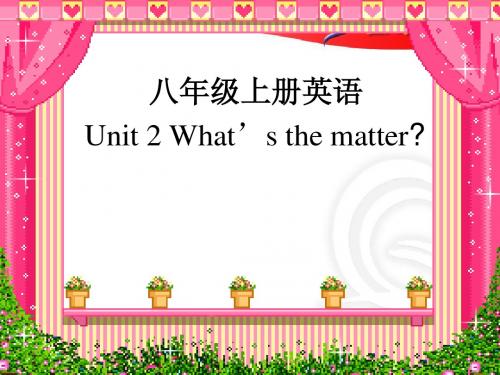
【语言目标】
• • • • What’s the matter? I have a headache. You should drink some tea. The sounds like a good idea. I have a sore back. That’s too bad . • I hope you feel better soon
• 15.Do you mind closing the window? 请把窗户关上好吗? • 翻译:在这里吸烟你介意吗? Do you mind smoking here?
• 16.Mary couldn’t help laughing at his jokes. 对于他的玩笑,玛莉忍不住笑了。 • 翻译:听到这个消息,我忍不住哭了起 来。
when I went in. 我进去时,她已经写完信了。 • 翻译:他踢完足球去游泳 了。 我洗完餐具后去商店了。
• 14.The doctor asked him to give up smoking. 医生叫他戒烟。 • 翻译:不要放弃学英语。 Don’t give up studying English.
• 8.When you are tired, you shouldn’t go out at night. 疲倦时,晚上你不该外出。 • 翻译: • 他小时候就知道要努力学习 了 • 他五岁就上学 了 • 我们进教室时,老师已经开始讲课了。
• I believe him, but I can’t believe in him. 他的话是真的,但是我不信任他这个 人。
believe 相信某人说的话 believe in g the piano every day. 我每天练习弹钢琴。 • 翻译:他每天练习踢足球。 • I practice playing soccer every day.
新目标英语八年级上册第二单元知识学习总结要点:What's the matter-
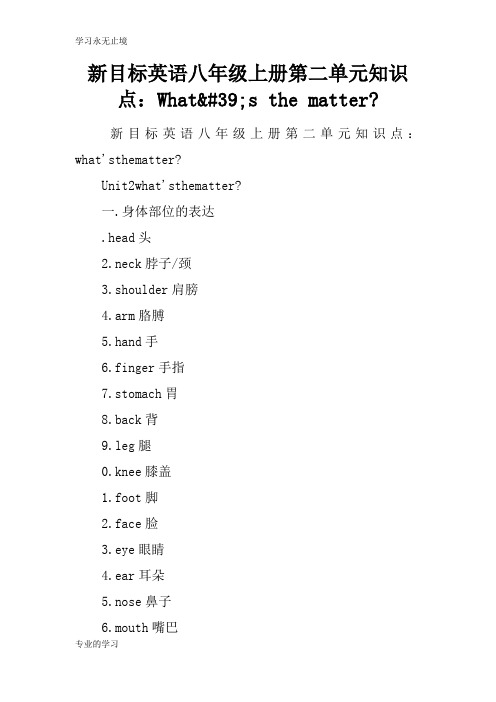
新目标英语八年级上册第二单元知识点:What's the matter?新目标英语八年级上册第二单元知识点:what'sthematter?Unit2what'sthematter?一.身体部位的表达.head头2.neck脖子/颈3.shoulder肩膀4.arm胳膊5.hand手6.finger手指7.stomach胃8.back背9.leg腿0.knee膝盖1.foot脚2.face脸3.eye眼睛4.ear耳朵5.nose鼻子6.mouth嘴巴7.tooth牙齿8.throat喉咙二.病情的表达.haveacold患感冒2.haveafever发烧3.haveaheadache头痛4.haveastomachache胃痛5.haveatoothache牙痛6.haveasorethroat喉咙痛7.haveasoreback背酸痛8.haveasoreneck脖子痛三.如何给建议.seeadoctor看医生2.drinklotsofhotwater多喝热水3.drinkhotteawithhoney喝加蜂蜜的热茶4.seeadentist看牙医5.takesomemedicine吃药6.shouldn'teatanything不该吃任何东西7.liedownandrest躺下休息8.gotobedearly早点睡觉9.listentomusic听音乐0.shouldn'teatanymore…不该再吃…四.看病的表达.what'smatter?怎么了?2.I'mnotfeelingwell.Ihavea…我感觉身体不适,我得了…3.whendiditstart?什么时候开始的?4.Itstarted…ago.…前开始的.5.That'stoobad.youshould/shouldn’t…那太糟糕了.你应该/不该…6.yes,Ithinkso./That’sagoodidea.是的,我也这样认为./好主意.7.Ihopeyoufeelbettersoon.我希望你早点好起来.五.重点短语.liedown躺下2.hotteawithhoney加蜂蜜的热茶3.feelbetter感觉好点4.gettired/angry/stressedout变得疲惫/生气/紧张,有压力5.traditionalchinesedoctors传统中医6.abalanceof………的平衡7.forexample例如8.toomuch太多9.chinesemedicine中药0.westerncountries西方国家1.eatabalanceddiet一个均衡的饮食2.afew一些/少许3.stay/keephealthy保持健康4.needtodosth.需要做某事5.atthemoment现在/此刻6.hostfamily寄宿家庭六.重点句型.EatingDangshenandHuangqiherbsisalsogoodforthis.吃党参和黄芪也对这方面有益.V-ing放句首当主语Eatingtoomuchjunkfoodisbadforourhealth.吃太多的垃圾食物对我们的健康有害.watchingTVforalongtimeisbadforoureyes.长时间看电视对我们的眼睛有害.ReadingEnglishnewspapersisgoodforourEnglishstudying.读英语报纸对我们学习英语有益.2.Peoplemayhavetoomuchyang.人可能是阳气过盛.为who引导的定语从句当先行词为人时,定语从句必须用关系词who引导Thosecanalwaysgetgoodgrades.那些人总能取得好成绩.Thestudentsareallmyclassmates.那些学生是我的同班同学.3.It'seasytohaveahealthylifestyle.拥有一个健康的生活方式容易.4.It'simportanttoeatabalanceddiet.保持饮食的均衡是重要的.5.Ibelieveit’simportanttosleepeighthoursanight.我相信一个晚上睡八个小时重要.It's+adj++todosth.做某事对某人来说…It'seasyforustofindouttheanswer.找出答案对我们来说是容易的.It'sbadforyoutoreadinthesun.在阳光下看书对不好.6.Ihaveatoothache.Ineedtoseeadentist.我牙痛,我需要去看牙医.needtodosth.需要做某事.weneedtokeepourclassroomclean.我们需要保持教室的干净.7.I'mnotfeelingwellatthemoment.我现在感觉身体不适.atthemoment=now现在/此时常用现在进行时8.Isometimesstaylateuntil2am.我有时学习到很晚,直到凌晨两点.9.Idon'tthinkI'mimproving.我认为我没有进步.0.I'msorrytohearthat…听到……我很抱歉/遗憾/感到难过【重要词组概览】◆haveacold 患感冒◆stressedout 紧张的,有压力的◆beansprout 豆芽◆gettired 感觉疲惫◆stayhealthy 保持健康◆atthemoment 此刻,现在◆ontheotherhand 另一方面◆getacold 患感冒◆seeadentist 看牙医◆gototheparty 去参加聚会◆makesbsick 使某人不舒服◆haveasorethroat 嗓子痛◆haveafever 发烧,发热◆haveatoothache 牙痛◆haveabackache 背痛◆haveaheadache 头痛【语法知识聚焦】看病需要和医生交流,这是英语口语中必不可少的内容。
小学英语PEP人教版六年级下册《Unit2What'sthematterMike》版说课稿
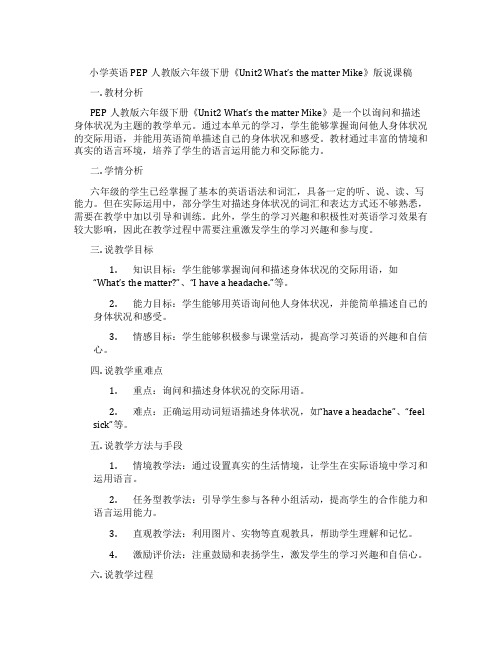
小学英语PEP人教版六年级下册《Unit2 What’s the matter Mike》版说课稿一. 教材分析PEP人教版六年级下册《Unit2 What’s the matter Mike》是一个以询问和描述身体状况为主题的教学单元。
通过本单元的学习,学生能够掌握询问他人身体状况的交际用语,并能用英语简单描述自己的身体状况和感受。
教材通过丰富的情境和真实的语言环境,培养了学生的语言运用能力和交际能力。
二. 学情分析六年级的学生已经掌握了基本的英语语法和词汇,具备一定的听、说、读、写能力。
但在实际运用中,部分学生对描述身体状况的词汇和表达方式还不够熟悉,需要在教学中加以引导和训练。
此外,学生的学习兴趣和积极性对英语学习效果有较大影响,因此在教学过程中需要注重激发学生的学习兴趣和参与度。
三. 说教学目标1.知识目标:学生能够掌握询问和描述身体状况的交际用语,如“What’s the matter?”、“I have a headache.”等。
2.能力目标:学生能够用英语询问他人身体状况,并能简单描述自己的身体状况和感受。
3.情感目标:学生能够积极参与课堂活动,提高学习英语的兴趣和自信心。
四. 说教学重难点1.重点:询问和描述身体状况的交际用语。
2.难点:正确运用动词短语描述身体状况,如“have a headache”、“feelsick”等。
五. 说教学方法与手段1.情境教学法:通过设置真实的生活情境,让学生在实际语境中学习和运用语言。
2.任务型教学法:引导学生参与各种小组活动,提高学生的合作能力和语言运用能力。
3.直观教学法:利用图片、实物等直观教具,帮助学生理解和记忆。
4.激励评价法:注重鼓励和表扬学生,激发学生的学习兴趣和自信心。
六. 说教学过程1.热身(5分钟):引导学生进行简单的英语对话,回顾已学的身体部位和动词短语。
2.呈现(10分钟):通过图片或实物展示,引入本课的主题,引导学生说出与身体有关的词汇。
初中英语备课参考 What’s the matter

4. foot [fut] n. 脚 【剖析】 复数 feet。 例如:Not all the animals have feet.并不是所有的动物都有脚。 【拓展】on foot 步行。例如:I go to school on foot every day. 我每天步行去上学。其同义句为:I walk to school every day. 【典型例题】
牙痛 have a backache 背痛 【典型例题】
have a fever 发烧 have a toothache (患)
You have a _________(胃痛),so you shouldn't eat anything for 24 hours. 【解析】stomachache 由题意和汉语可知答案。
I have a cold.(就划线部分提问)
you?
【解析】What’s the matter with 题目中划线部分内容为身体状况,询问身体不舒服时,
可以用 What’s the matter with sb.?句型。 6. You should lie down and rest. 你应该躺下休息。 【剖析】
Unit 2 What's the matter, Mike
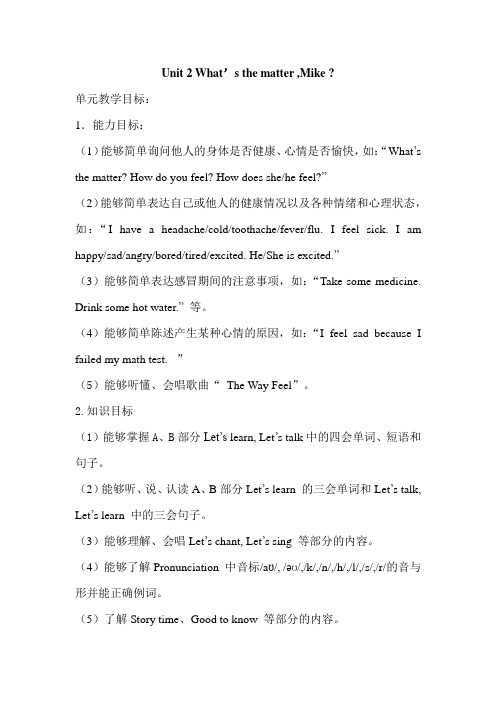
Unit 2 What’s the matter ,Mike ?单元教学目标:1.能力目标:(1)能够简单询问他人的身体是否健康、心情是否愉快,如:“What’s the matter? How do you feel? How does she/he feel?”(2)能够简单表达自己或他人的健康情况以及各种情绪和心理状态,如:“I have a headache/cold/toothache/fever/flu. I feel sick. I am happy/sad/angry/bored/tired/excited. He/She is excited.”(3)能够简单表达感冒期间的注意事项,如:“Take some medicine. Drink some hot water.”等。
(4)能够简单陈述产生某种心情的原因,如:“I feel sad because I failed my math test. ”(5)能够听懂、会唱歌曲“The Way Feel”。
2.知识目标(1)能够掌握A、B部分Let’s learn, Let’s talk中的四会单词、短语和句子。
(2)能够听、说、认读A、B部分Let’s learn 的三会单词和Let’s talk, Let’s learn 中的三会句子。
(3)能够理解、会唱Let’s chant, Let’s sing 等部分的内容。
(4)能够了解Pronunciation 中音标/aʊ/, /əʊ/,/k/,/n/,/h/,/l/,/s/,/r/的音与形并能正确例词。
(5)了解Story time、Good to know 等部分的内容。
3. 情感、策略、文化等有关目标(1)情感态度:培养学生团结友爱、关心他人的良好品质。
增强学生的集体荣誉感和耐挫能力。
(2)学习策略:引导学生在学习过程中注重合作学习,利用教材中设计的Pair work、Group work、Let’s play以及task time部分,培养学生合作学习的意识。
- 1、下载文档前请自行甄别文档内容的完整性,平台不提供额外的编辑、内容补充、找答案等附加服务。
- 2、"仅部分预览"的文档,不可在线预览部分如存在完整性等问题,可反馈申请退款(可完整预览的文档不适用该条件!)。
- 3、如文档侵犯您的权益,请联系客服反馈,我们会尽快为您处理(人工客服工作时间:9:00-18:30)。
Unit 2 What's the matter
一、重点词组
have/get a cold 患感冒(clod n.感冒 adj.冷的)
get tired =be tired 感觉疲惫
stay healthy 保持健康
at the moment = now 此刻,现在
on the one hand.....on the other hand 一方面....另一方面see a dentist 看牙医
go to the party 去参加聚会
have a sore throat 嗓子痛
have a fever 发烧,发热
have a toothache/headache/backache 牙痛/头痛/背痛
注:一般情况下用have+a+n.表示患了某种疾病
eg.have a + 疾病名称
have a sore + 患病部位.
enjoy oneself (myself, yourself, herself, himself, themselv es,ourselves,itself)=have a good time=have fun玩得高兴,过得愉快
二、交际用语
1.关心别人:你怎么啦?
What’s the matter (with you)?
=What’s wrong (with you)?
=What's the trouble (with you)?(同义句转换)
说明:wrong是形容词,前面没有“the”; matter和trouble都是名词,前面应有“the”, trouble前还可以用形容词性的物主代词。
2、回答:
第一种:I have a sore throat。
I have a toothache/headache/backache.
说明:sore“痛,疼”,通常指因发炎引起的肌肉疼,在表示身体的某部位疼痛时,常置于部位名词前。
ache常指持续性的疼痛,它常与身体部位的名词构成复合词,如:headache头痛,backache背疼等。
第二种:There is something wrong with my tooth。
我的牙出问题了。
(复习there be 句型)
There is something wrong with ….=Something is wrong with ………有毛病/出了问题.
第三种:I’m not feeling well =I don’t feel well.
(同义句转换) 我感觉不好.
I feel terrible . 我感觉糟透了。
I feel very ill . 我感觉病得很重。
注:1.feel v.(自己)感觉到...(心情)觉得..+形容词
e.g. I feel hungry/sick.我觉得饿(不舒服)。
2.well adj.健康(well只有作“健康的”讲时才是形容词)
feel well 表示“身体上舒服”
feel good表示“心情上舒服”
3、询问建议:ask sb for advice
advice意为“建议,忠告”,是不可数名词。
一条建议 a piece of advice
二条两条建议 two pieces of advice.
三条一些建议 some advice
与advice搭配构成短语的有:
ask sb. for advice 请……提出建议
give sb. advice 给……提出建议
take one's advice 采纳某人的建议
“有关……的建议”应用advice on /about sth.
表示建议:
4.You should drink some hot water. 你应该喝点热水。
should情态动词“应该”,shouldn't“不应该”,其后接动词原形,没有人称和数的变化,用于提出建议。
should
是一个情态动词,意思是“应该,应当”,表示建议,它用于所有人称,其后接动词原形,否定形式是在其后加not,也可以缩写为shouldn’t,变为一般疑问句时.(复习情态动词may,would,can)
用来表示建议还可能用以下句型:
Let's go to play soccer. 我们去踢足球吧。
Why not go home together? 为什么不一起回家呢?(一起回家
吧。
)
How /What about watching TV? 看电视好吗?
6评价建议, 表达祝愿
I’m sorry to hear that.
I’m sorry to hear that you are not feeling well.
Yes, I think so.
That’s a good idea.
I hope you feel better soon.
重点词组:
1.too much +不可数名词 too many +可数名词复数形式
2.Although:虽然 but:但是不能同时出现(类似的还有:because 因为 so 所以)
3.Little 几乎没有 a little 有一些
4.It +be+adj+to do sth 做某事怎么样
Eg:It’s easy to have a healthy lifestyle, and it’s important to eat a balanced diet.
有一个健康的生活方式很容易,饮食平衡是很重要的
5.stay healthy=keep healthy=keep in good health= keep fit保持健康
6.V+doing+sth
enjoy sth. =like sth. (名词)喜欢某物, enjoy doing sth.喜欢做某事=like dong sth
Practice doing sth.练习做某事
mind doing sth. 介意做某事
finish doing sth.完成某事
give up doing sth.放弃做某事
can’t help doing sth.忍不住做某事keep ding sth. 坚持做某事
7.stressed out 筋疲力尽
8..healthy food 健康食品
9.a healthy lifestyle健康的生活方式
10.to eat a balance diet饮食平衡
11. I have no idea = I don’t know 我不知道
翻译:(1)他怎么了?他胃痛
(2)should我应该上床睡觉。
李平应该躺下休息。
我们不应该上课吃东西。
(3)be good for/be bad for
吃一些蔬菜和水果对你的健康有好处。
看电视太多对你的眼睛有害。
